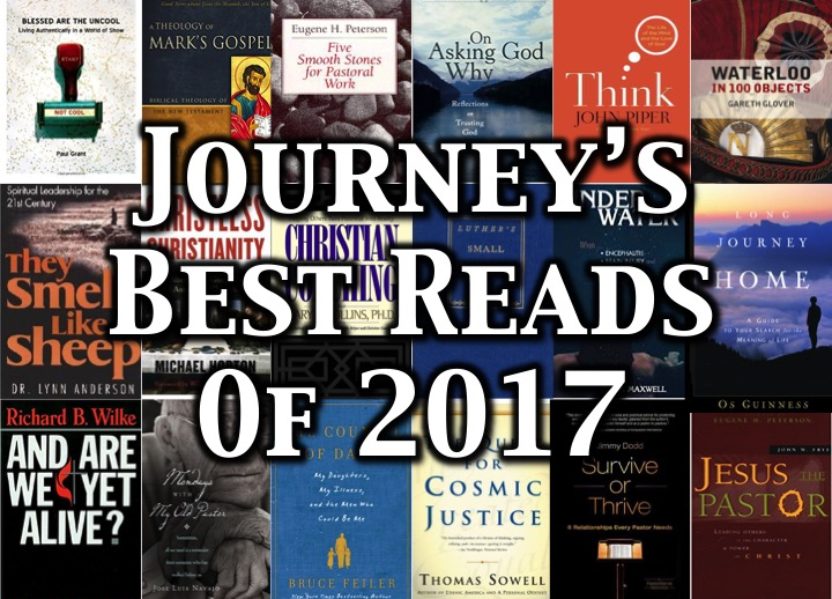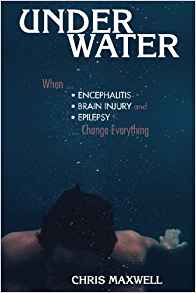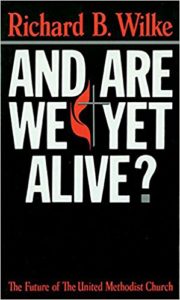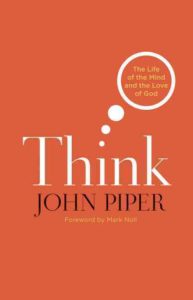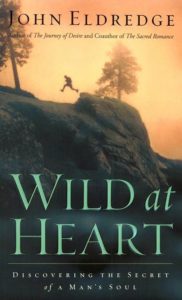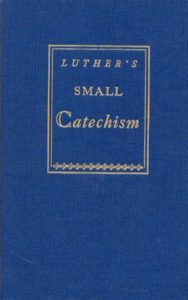Journey’s Best Reads of 2017
In 2017, as is true every year, we read a number of good books, a few great books, and a couple of “why was this ever published” books (no, you won’t find books of the last category in this list). 2017 was another great reading year with many happy hours invested with the essential “Big Three”: good music, good coffee and a good book.
As the year ends, we offer up our list of our favorite reads in 2017. This is not our list of the best books published in 2017, but the best of the books we read in 2017, whatever the publishing year. Rather than follow the latest-and-greatest “must reads,” we choose to follow the sage counsel of C.S. Lewis, who said, “It is a good rule, after reading a new book, never to allow yourself another new one till you have read an old one in between,” and it’s advice we’ve followed. If a book is on this list, we recommend you give it a read in 2018.
And so, Journey presents our favorite reads for 2017, listed by subject. Each title is followed by the author’s name and a brief description of the “what” and the “why” of the book’s inclusion here. Warning! While the overwhelming majority of our top reads are Christian books addressing subjects like discipleship, pastoral ministry and the inner life, there are a few selections from other quarters in literature, and a couple of surprises along the way. Enjoy.
By the way, you can always find our list of recommended books online in the Journey Library. Check out our shelves at journeypastoralcoaching.com/the-jpc-library/
BIOGRAPHY
Chris Maxwell is a friend of mine. He is a gifted preacher, pastor, coach, and author. His book, Pause for Pastors, ranks as one of my very favorite books for pastors. He is also a survivor. And a thriver. Some years ago, while pastoring, Chris suffered seizures originating from encephalitis brought on by epilepsy. I’ve seen the MRI of his brain and can attest to the incredible walking miracle of God in the life of Chris Maxwell. His journey through that impossible challenge to this day is the story of Underwater. It is a great read for any individual who has had seizures, the family of such an individual, or any one in need of a miracle or motivation to continue believing God for their miracle.
CHURCH
And Are We Yet Alive – Richard B. Wilke
This book sits on a short shelf of books I re-read on a regular basis. And for good reason. Written by a United Method Church bishop to the UMC, it nevertheless asks the church at large if it is still alive or only an empty shell? If all of our structures, programs, activities, methods, goals are actually preventing us from being the body of Christ, Christ’s temple of living stones, and preparing ourselves as the bride of Christ. Far from a diatribe, this is a call, a plea really, to come back to true New Testament life and mission as the church of Jesus Christ. Chapter One opens the book with the diagnosis that the church is sick unto death, but the final chapter stands before the empty tomb and calls out clearly, “It’s time to burn” again. These 124 pages have the potential to guide you into a fresh experience with Jesus, and your church into a legitimate, Spirit-led, Spirit-fed revival.
CHURCH AND CULTURE
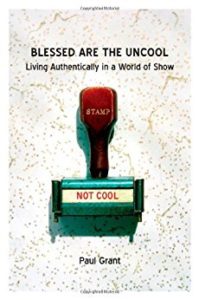 Blessed Are the Uncool – Paul Grant
Blessed Are the Uncool – Paul Grant
A book that doesn’t just step on our toes, but fairly jumps on them, asking repeatedly if we are disciples of the Christ or of the cool? The younger Christian will read this book and feel the carpet being veritably pulled from under his or her feet: does following Jesus really require this of me? The older Christian will read this book and feel the carpet warming under his feet as he nods in agreement with the author’s “J’accuse” of current culture and its power over the church. However, if the older Christian truly understands the author’s point, he will see himself falling into the same trap of following the cool rather than the Christ: grey-hairs are just as prone to follow their own culture over Christ, whatever the culture may be. Don’t get comfortable as you read this one. Get ready for some head-shaking, some questioning, some disagreements, and some challenges. Note that the BATC was written by an MK, someone whose perspective on American Christianity as a third culture kid is worth considering.
CULTURE
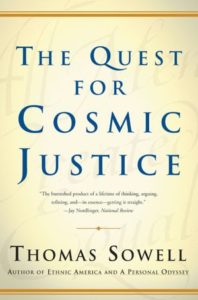 The Quest for Cosmic Justice – Thomas Sowell
The Quest for Cosmic Justice – Thomas Sowell
Written by one of the greatest minds in America, TQFCJ examines how unrealistic ideas of justice have damaged and hamstrung American culture, making true justice impossible and pervasive injustice the norm. Sowell writes about a belief in utopian perfection has led to a tyranny of social visions that ignore cause and effect, right and wrong, and the consequences of wrong beliefs and unhealthy practices. This is another book that will not make you comfortable. It will challenge you and make you think about principles rather policies free of principles, dealing with reality rather than fantasy, freedom rather than license. Not a Christian book, but a provocative look at American society and what ails it. Yes, it deals with economics, politics, law, education, etc, but it is really a book about truth and justice. Another of my short shelf books.
DISCIPLESHIP
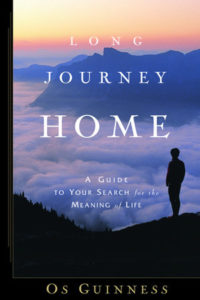 Long Journey Home – Os Guinness
Long Journey Home – Os Guinness
What is life? This is the question Guinness tackles in LJH. But not in a cold, philosophical way, nor in a preachy theological way. Guinness takes the tack of one who joins our journey and leads us through the questions common to all human beings on the issue of the meaning of life. His knowledge of world cultures and literature is incredible and used very effectively by Guinness in helping us see life’s oldest question in new ways. Life is a journey, but where does it all lead and how can I successfully complete it? LJH is a great read for the Christian, to be sure, but especially for the non-Christian.
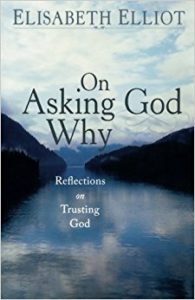 On Asking God Why – Elisabeth Elliot
On Asking God Why – Elisabeth Elliot
I have always had a great appreciation for the writing of Elisabeth Elliot. She writes in a way that is deep and yet so understandable: she takes the real issues of life, goes deep in them, and then writes in highly readable ways about them. This is especially evident in OAGW as she writes thirty short chapters on thirty deep issues of life: life and death, marriage and divorce, birth and abortion, God’s will and mine, and more. The publisher describes this book as a collection of meditations, and rightly so, for even as Elliot makes her point in each brief chapter, she does so in a way that invites the reader to think, really think, for him or herself. If you like easy, thoughtless answers, read the New York Times or watch CNN, but if you want principles, truth, and food for thought, this is the book for you. Written by a follower of Jesus who taught us so much of the Lord she loved and knew so well.
Think is a book about thinking, a primer on how to think Christianly. Not what to think as Christians, but how to think as Christians, how thinking Christianly is worshipping God with our minds. In a time when society and church exalt feeling over thinking and emotional response is regarded as intelligent reflection, this is a much needed book. The American church today is populated with people who no longer think about their faith, but instead, live only to feel the buzz of their faith own designer faith. If Sunday services at church make people feel good/close to God/happy/loved/etc, the chances are good that they will be back again next Sunday, and so, pastors and church leaders have done their job – at least in this present church culture. Don’t say it’s not true, pastors – I have too many conversations with too many pastors to believe otherwise. Discipleship is on the decline. Bible literacy is disappearing. Sermons that present the theology of Scripture are more and more rare (Paul’s introduction to Christian theology, the book of Romans, is considered “too deep” for preaching by many pastors.”) In other words, the church is, in many ways, going pre-Reformation comatose when it comes to knowing our faith and thinking Christianly. Piper writes to help Christians keep the greatest commandment: “Love the Lord your God with all your heart and with all your soul and with all your strength and with all your mind” (Luke 10.27).
MANHOOD, FATHERHOOD AND LEGACY
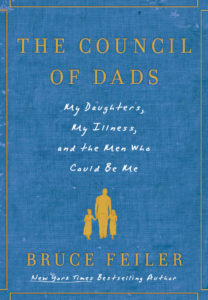 The Council of Dads – Bruce Feiler
The Council of Dads – Bruce Feiler
The story of a young father who faces two crises of the heart at one moment: his own terminal cancer, and the thought of his two daughters growing up without him. He determined that he could face his cancer, but not a life for his daughters that did not include him: how could he be present in their lives if he were gone? Feiler comes to a powerful and precious solution: if he could not be physically present with his daughters as they grew, he could be present with them through the lives of six close friends if they would agree to step into the gap for him, speaking his story, his wisdom, his love into their lives. He called this group “The Council of Dads.” The Council of Dads is the story of Feiler facing his cancer, inviting his friends to be members of this council, and what happened next. This is not a Christian book, and so, the language and themes can make you shake your head, but the book’s heartbeat is well worth listening to.
What it means to be a man. Period. No, you won’t find this book being taught in most schools or universities, but you will find its truths written in the nature of every man. As culture continues with its gender confusion and its attacks on biblical manhood, Eldredge celebrates the creation of God, the human male. We are adventurers, darers, and doers who are looking for a cause to live for, a battle to win, a rescue to lead. We are not better or worse than the female, neither are we higher or lower than her. What we are is the design of God, formed by the hand of God with purpose. As men, we reveal God in our own unique way. As men, we love and lead our families in our own unique way. As men, we are what God intended: wild at heart, to the glory and the pleasure of the God who designed us. A must read.
HISTORY
 Waterloo in 100 Objects – Gareth Glover
Waterloo in 100 Objects – Gareth Glover
As missionaries in Europe, our family lived in Belgium for many years. Four of those years were happily spent on the far southside of Brussels in the city of Waterloo, a city made famous by a single history-changing battle that bears the city’s name: the Battle of Waterloo. The battle, which took place in 1815, is still very much a part of life in Waterloo, its environs marked by the vast battlefield and buildings that remain, as well as the famous “Butte du Lion” or Lion’s Mound that sets in the battlefield today. Visitors from around the world continue to come daily to visit the battlefield that served as the final defeat of one of history’s greatest generals, Napoleon. Museums and private collections contain many, many artifacts from the battle, each artifact a glimpse into army and civilian life at that time. This book Waterloo in 100 Objects, retells the story of the Battle of Waterloo through 100 artifacts, objects like uniforms, weapons, bones, and more If you are history buff (and I am), this is a fascinating book about one of history’s most famous battles. As a former resident of the city and a frequent visitor to the battle sites, this book is all the more fascinating.
PASTORAL COACHING AND MENTORSHIP
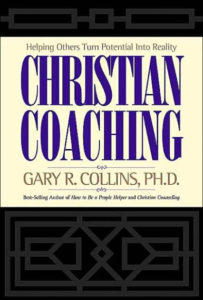 Christian Coaching – Gary Collins
Christian Coaching – Gary Collins
Still the standard of books on pastoral coaching. This is another book that sets on my short shelf of “already read, still reading, to read again” selections.
Collins gives the reader a primer on pastoral coaching – what it is (and what it isn’t), the values and goals of pastoral coaching, the marks of quality pastoral coach, what takes place in effective pastoral coaching sessions, and more.
The is the first book to read in your study of pastoral coaching. It doesn’t have the pretty cover of some better known books, but what it lacks on the cover, it more than makes up between its covers.
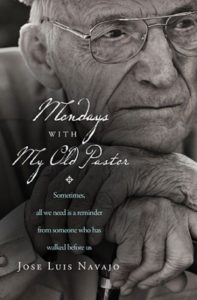 Mondays With My Old Pastor – José Luis Navajo
Mondays With My Old Pastor – José Luis Navajo
Everyone who has a “pastor for life” in his or her heart will love this rich “diary” describing in narrative form, a pastor’s Monday conversations with his “pastor for life.” These pages are a relationship in ink: wise, sentimental, heartwarming, heartbreaking, thought provoking, and loving. You’ll want to call your pastor for life after reading this page turner.
A must read for every pastor for two reasons: personal encouragement as you daily and diligently do your pastoral duties, and for the way it will reconnect you with your pastor-mentor. Note: this book is yet another of the great books recommended to us by aJourney member.
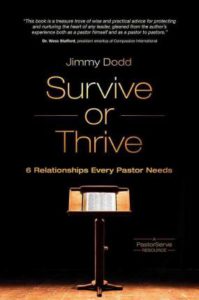 Survive or Thrive – Jimmy Dodd
Survive or Thrive – Jimmy Dodd
A must read of must reads. Survive or Thrive focuses on the six relationships vital to every pastor, missionary or ministry leader: boss, coach, counselor, teacher, mentor and friend. The assessment and reflection tools are indispensable. The descriptions of the six relationships and their value to the minister are amazing.
As I read this book, countless events, moments, relationships, breakdowns, burnouts, opportunities, and experiences from the lives of others and my own life came to mind – the naiveté of ministers, young and old, who think they are tough enough to go it alone, the young ministers who have told me they are “too busy” to have a pastoral coach, the peers who have gone cold caricature when, years ago as young ministers, they burned with a holy fire for God and the souls of people.
This was the most important book I read in 2017. The truth be told, I cannot put it down: I continue to return to it again and again to apply to my own discipleship and to my pastoring of young ministers.
PASTORAL MINISTRY
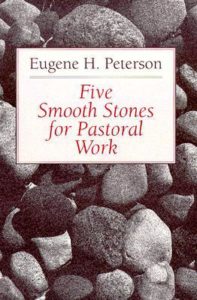 Five Smooth Stones for Pastoral Work – Eugene Peterson
Five Smooth Stones for Pastoral Work – Eugene Peterson
In recent years I have found several books that take the unspeakable heart issues of a pastor and put them on paper, books that say what we wish we could have said, if only we had the words. FSSFPW does this and more, every page an invitation to reflect not on the work of pastoring so much as the life of the pastor. Reading this book is like a cup of coffee by the fireside in a lakeside mountain cabin: its themes and thoughts draw its readers into their creation and call as pastors, what it really is to be a shepherd of God’s people. I found myself taking a very long time to read each page as my mind and heart followed the golden thought threads in contemplation and reflection. Written a few years ago, it is, nevertheless, a new favorite of mine.
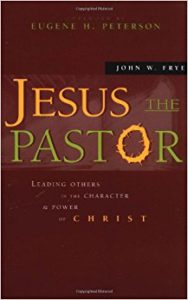 Jesus the Pastor – John W. Frye
Jesus the Pastor – John W. Frye
Pure and simple, a presentation of Jesus as shepherd and a call to be His undershepherds to His people. Frye focuses our attention on Jesus as a pastor to people, and asks if pastoring as Jesus pastored is not the only way to pastor, to be faithful undershepherds of His people. Frye asks how we can call ourselves pastors of God’s people if we are not undershepherds of Jesus, the Good Shepherd? Where many in the 21st century call for a new model of pastoring built on leadership and business techniques, Frye calls us back to the timeless and transcendent teachings of Scripture, back to that truth for which God will one hold us accountable as pastors: imperfect as we are, did we shepherd His people?
This is another heart book for pastors, one that puts the true pastor’s heart on paper. Every chapter is rich in its biblical teaching and fresh in its present application. When I purchased this book, I thought I was picking up just another pastor’s thoughts on pastoring. I was not prepared for the richness I found in these pages. Highly recommended.
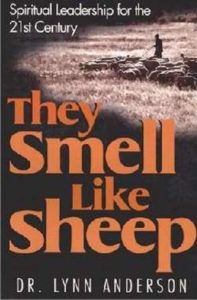 They Smell Like Sheep – Lynn Anderson
They Smell Like Sheep – Lynn Anderson
Like Jesus the Pastor, They Smell Like Sheep is a call to pastors, a recall really, to actually being shepherds to the people of God. Avoiding cultural ministry models, Anderson unapologetically calls pastors back to their biblical roles of shepherding, mentoring, and equipping God’s people. It is setting deeply into these roles that sets up the relationship God intended between pastor and people, and even more, a relationship that fits our creation as human beings.
Pastors must again recognize God’s Jeremiah 1.5 creation of all people and every individual, and so, relate to them in ways that fit their creation. The good farmer feeds his cattle and horses not what he wants to feed them, but what they need in accordance with their creation: not candy, but corn, oats, or hay. The farmer does not do this from a desk or an office, but in the fields and barns, at the point of his herds’ need. Likewise, pastoring is proving for God’s people according to their creation, and that means relationship: relationship as the shepherds, mentors and equippers they need. With this call to fulfill our role as pastors comes the command to live up to our call by being people of character, of experience and of vision. As pastors do these things, they will not only smell like the sheep they pastor, but they will serve them, and God, well.
THEOLOGY
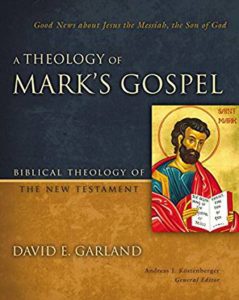 A Theology of Mark – David E. Garland
A Theology of Mark – David E. Garland
A Theology of Mark is a commentary on the second Gospel of the New Testament, but it is more. Where many commentaries on the shortest of the Gospels are marked by their brevity and simple treatments of the text, Garland’s look is a thorough and in-depth analysis: it treats this rich book with the respect it deserves.
Many commentaries basically reduce their treatment of Mark to it’s theme: Jesus went, Jesus said, and Jesus did. But Mark’s theme is not its only thought, and Garland makes this clear in his careful examination of the Mark’s presentation of the Messiah. The book is also marked by its presentation and study of the text rather than the presentation and exposition of the commentator’s thoughts on the text. A very worthy addition to your reference library.
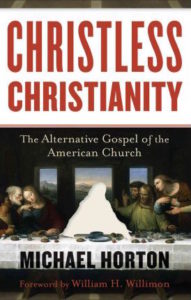 Christless Christianty – Michael Horton
Christless Christianty – Michael Horton
Horton writes a prophetic call to the church to return to the Gospel. He argues that the church has surrendered its message, and so, its soul to contemporary culture, choosing to believe and follow culture rather than Christ. Where the Gospel message of the Scriptures point to man’s sin separation from God and need of God’s appointed Savior, Jesus Christ, the gospel message of culture is something quite different. Horton labels it moralistic, therapeutic deism, a message requiring no confrontation of our sin problem, no confession of sin, no repentance of sin, and no complete trust in the finished work of Christ’s cross.
Horton sounds a new Reformation call to the church, a call to return to the Scriptures and the Scriptures alone as our rule of faith and practice, and the return of the Gospel to its rightful place as our sole message of salvation. Forget the pop culture cotton candy theology dispensed by so many today: this is theological meat and food for the soul.
I am not a Lutheran, therefore, I do not agree with all that I find in this book. There’s the disclaimer for all who may think I have moved from my church home to another. But that said, this is a most worthwhile read for its clear and focused teaching on the Gospel, the Gospel and the Gospel. It dispenses with the usual pop theology and opinion found in most books and, instead, gives us an insistent and persistent examination of the Gospel of Jesus in concise but complete teaching.
The “Christian” book market is flooded today with so many “I,Me, My” books: “I think, feel and say,” to “Here’s what it means to ME,” and on to “This is MY method, idea, experience, opinion,” and so few that are truly Christian, ie, focused on Jesus Christ and His Gospel: “He, Him, and His”: “He is Lord and Savior,” to “ Because I belong to Him, this is how I live,” and “His teaching and commands are these.” Who Jesus is, What Jesus Says, and What Jesus did for us are the theme of this very old, but always fresh book on the Gospel. As I say, you won’t agree with all you find here, but it will serve you well in its presentation, it’s insistence that you think about the Biblical teaching, and that you know know that you know what you believe and why.
______________
NOTE: Journey Pastoral Coaching provides pastoral coaching to Millennial ministers.
Saddled with large student debt, just beginning to set up homes and start families, and serving in low paying first and second positions, Millennials are those who most desire but can least afford to pay for pastoral coaching.
So we offer it to them at no cost.
We are able to do so through the faithful and generous gifts of friends who want to see young leaders not only enter the ministry, but remain in the ministry. If you or your church would like to help Millennial ministers in 21 US states and 5 nations build strong for a lifetime in ministry, please click here to contact us by email or to support Journey monthly or with your one-time gift. Thank you.
We also invite you to click and subscribe to our twice-monthly blogs at journeypastoralcoaching.com


